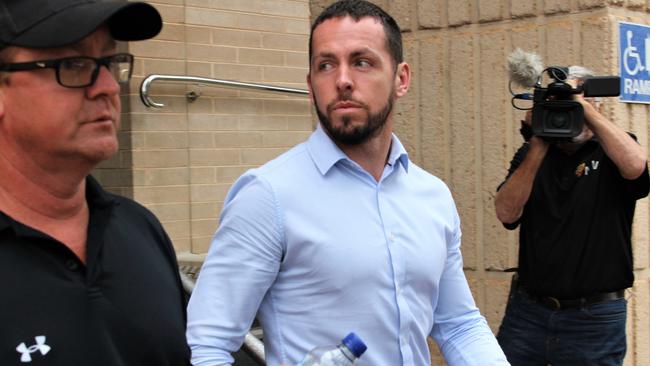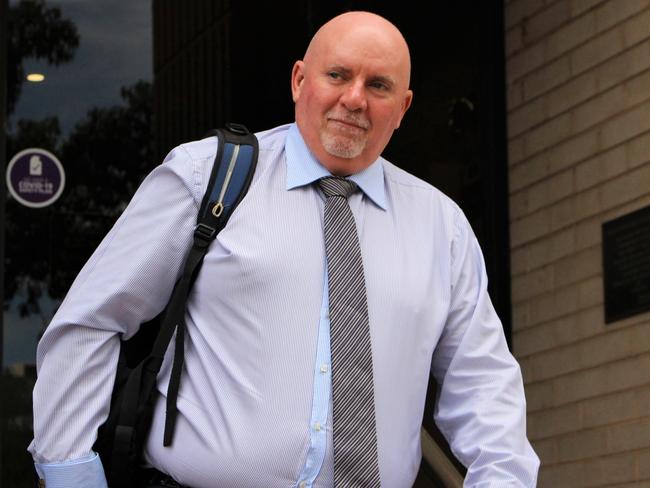Opinion: Zach Rolfe investigation ‘bias’ claims point to wider issue with expert testimony
A controversial report prepared during the investigation into the fatal police shooting of Kumanjayi Walker is not the smoking gun Zach Rolfe’s supporters claim, writes Jason Walls.

Police & Courts
Don't miss out on the headlines from Police & Courts. Followed categories will be added to My News.
Dissatisfaction over the handling of the investigation into the fatal shooting of Kumanjayi Walker by then constable Zach Rolfe is widely believed to have been a key factor in the downfall of former NT Police Commissioner Jamie Chalker.
A no-confidence vote by the force’s rank and file that came just months before Mr Chalker’s exit from the top job was called in the immediate aftermath of Mr Rolfe’s acquittal and may have led, at least in part, to the government forming the same conclusion last month.
And for Mr Rolfe’s supporters, revelations contained in a report prepared for Territory Coroner Elisabeth Armitage by Commander David Proctor represent the smoking gun that shows investigators were determined to see Mr Rolfe convicted of murder at all costs.
But that report, now almost two years old, was until recently the subject of a non-publication order issued by Ms Armitage, and for good reason.
Many of the conclusions drawn by Mr Proctor, while reached in good faith based on the information to hand at the time, are now known to have been misguided by assumptions that turned out to be incorrect.
Mr Proctor conceded as much in November when he was asked by counsel assisting the Coroner Patrick Coleridge about his conclusion the investigation into the shooting had been tainted by “confirmation bias” against Mr Rolfe.
Mr Coleridge: “Although you couldn’t exclude the possibility of confirmation bias in any (particular) case, you wouldn’t be of the opinion that there was confirmation bias in this case?”
Mr Proctor: “Not on the more recent evidence provided, no.”
It was for precisely this reason that Ms Armitage made the decision not to publish the report’s outdated conclusions before their author could be cross examined in light of the evidence that emerged at the inquest.
There is no doubt mistakes were made in the investigation, including as set out in a decision of Supreme Court Justice Dean Mildren that was critical of a failure by investigators to hand over Mr Proctor’s report to prosecutors and Mr Rolfe’s own lawyers, regardless of its limitations.
But those mistakes only serve as proof of the old adage contained in Hanlon’s razor – to never attribute to conspiracy that which can be explained by incompetence – and if anything, point to investigative failings that could have diminished the prospect of a successful prosecution.
Take, for example, passages contained in another report prepared even earlier than that of Mr Proctor by Commander Scott Pollack, that reveal then Deputy Director of Public Prosecutions Matt Nathan SC recommended against the retention of US criminologist Geoffrey Alpert as an expert witness in the case.

To construe his warning that Professor Alpert could be vulnerable “to cross examination around relevancy and being portrayed as an ivory tower academic” as anything other than a caution against calling a witness that might be unhelpful to the prosecution case can only be described as a wilful misinterpretation of the obvious intent of his words.
But the saga does point to a wider problem with expert testimony.
Despite police initially pushing ahead with the use of Professor Alpert, ultimately the only expert witness called by the Crown at Mr Rolfe’s trial was NT Police Senior Sergeant Andrew Barram, who told the jury it was neither “reasonable” nor “necessary” for Mr Rolfe to have fired the fatal shots.
In general, prosecutors are required to call every witness who can provide relevant testimony about an alleged offence, whether helpful to their case or otherwise, but this is not so when it comes to expert witnesses, due in part to the impracticality of tracking down every academic in the world with potentially relevant qualifications.
In this case, Mr Rolfe had a highly experienced and effective legal team who were able to secure an expert witness of their own in Ben McDevitt, an impeccably qualified former Australian Federal Police special operations team leader and field supervisor, who testified powerfully in defence of Mr Rolfe’s actions.
But not everyone is so lucky, and while those who can’t afford their chosen silk are entitled to government funded representation, those defendants are stuck with whichever counsel is appointed for them, whose ability to secure an expert of Mr McDevitt’s calibre in fields that sometimes vastly differ from their own legal qualifications, may be lacking.
While no injustice was done in Mr Rolfe’s case, at times it means defendants can be placed at a significant forensic disadvantage – one need look no further than the results of a recent judicial inquiry into the convictions of Kathleen Folbigg for a salient example.
There is no easy solution to this thorny issue but it warrants far more attention than erroneous assumptions and the deliberate misreading of advice that was, in any event, ultimately followed.




